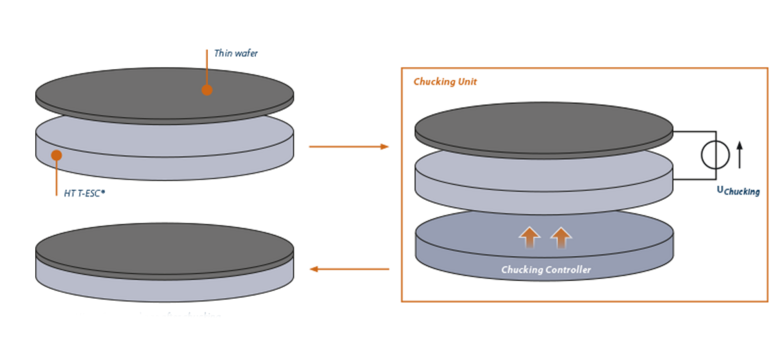
protec carrier systems
machinery
Typical Applications
-
Thin wafer handling support during processes involving high temperature impact (up to 400 °C), vacuum-suited
-
Compatibility with existing handling systems (transport cassettes, vacuum, Bernoulli or mechanical end effectors, etc.)
-
Ultra low contamination
-
High flatness
-
Outgassing free
-
Reusable
-
Sizes from 2" to 12", customized shapes and features possible
SEMI conform package after chucking mounted wafer ready for application
-
Thickness of package ~750 μm
-
Package can be handled and processed by standard equipment
Recommended Processes
-
Electroplating
-
Annealing
-
DIE Handling
-
Handling

Handling
During the wafer processing the wafer needs to be transferred back and forth from the cassettes to the tools and also inside the tools from one station to the other. For fragile substrates this is already challenging, because they tend to break or get cracks, which can lead to future breakage. Also the bowing of thinned substrates brings a lot of trouble for all tooling because they are usually not designed for this very special operation. Temporary bonding with our T-ESC® is a great help here as the processing tools only see a standard wafer and trouble with handling. Therefore, the wafer breakage is eliminated.
Electro Plating
Electro Plating is a method for forming layers out of a liquid phase onto a substrate. The desired regions are masked and the substrate is dipped into the bath. Usually the backside is covered and by applying an electrical field between the substrate and the liquid a layer is formed on the uncovered surface of the substrate.
Annealing
The substrate is heated up to a specific temperature, e.g. after ion implantation to heal the damage from the process.
DIE Handling
Multiple substrate operations are often required when already diced DIEs need further processing in an economical way. Multiple of them can be temporarily bonded to our Mobile Electrostatic Carrier (T-ESC®) and processed as a standard wafer size. After that they can be transferred to the final substrate and bonded with releasing the T-ESC® afterwards.
